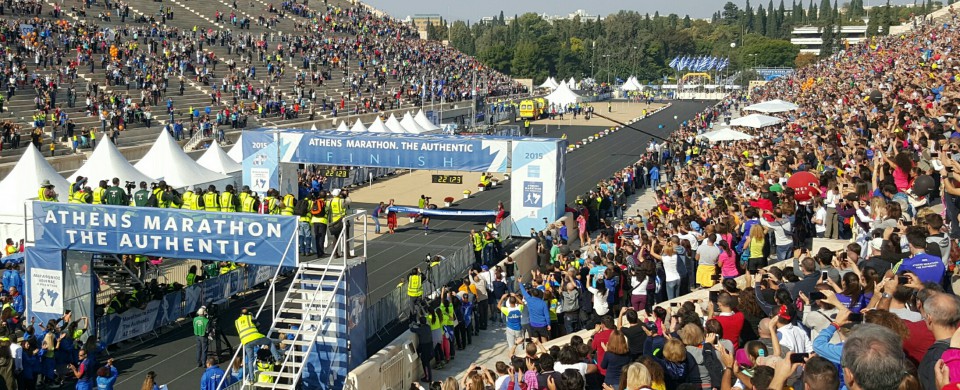Enduring Lambrakis story sets example for crisis-torn athletics
Athens was a good place to be yesterday if you needed an antidote to the contagion that has left athletics in a critical condition.
While world anti-doping agency (WADA) investigators in Geneva were preparing to reveal their findings on corruption in the sport, I was glad to be half a continent away watching the ‘authentic’ marathon being held in the Greek capital without an elite runner in sight.
Austerity dictated that appearance money could not be paid, but the event – with its 16,000 enthusiastic participants – was the richer for it.
Don’t get me wrong: I believe the vast majority of top athletes labour hard and fairly for their rewards. But it seemed appropriate that, on this weekend above all others, the Athens marathon should affirm the concept of competition for its own sake – competition that is as much against oneself for a personal best as to beat anyone else.
It also seemed apt that the event has, since 1981, been dedicated to Gregoris Lambrakis, an outstanding athlete of another era who went on to give his life, literally, in the fight for democracy.
Lambrakis represented Greece in the long jump and triple jump at the 1936 Olympics in Berlin and set a Greek record in the former that would stand for 23 years.
But his sporting achievements were merely a prelude to an extraordinary life that saw him fight in the Greek resistance to Nazi occupation, qualify as a doctor, run clinics and food banks for the poor and become an MP and international peace campaigner.
In 1963, when a peace march from the town of Marathon to central Athens was banned by the police, Lambrakis used his parliamentary immunity to walk the route alone in protest.
A few weeks later, after delivering a speech at a rally in Thessaloniki, he was attacked by right wing extremists and never recovered from the severe head injuries they inflicted.
The story of the assassination of Lambrakis was later told in the political novel Z – meaning ‘zei’ or ‘he lives’ – by Vassilios Vassilikos, which was adapted into an Oscar-nominated movie of the same name.
The Lambrakis story endures because it is about a person risking everything for the greater good – and what a contrast that is with the shabby, self-serving behaviour of some of those who run the governing bodies of sport.
WADA’s report to be published today will cover allegations of both doping among Russian athletes and payments extracted by former IAAF officials to cover it up.
It seems this latest crisis is not so much about the anti-doping tests themselves as the use of test results by people in whom the sport had put their trust to extort money from guilty athletes.
In my view, Guardian correspondent Owen Gibson got to the heart of the matter at the weekend when he said those involved were ‘of the generation who ascended to power when previously amateur sports suddenly became awash with cash from sponsors and broadcasters, yet retained governance structures and a lofty attitude more suited to a private members’ club’.
While there continue to be scientific challenges for athletics in fighting doping cheats, this is primarily an issue of governance – the IAAF, like all international sports governing bodies, needs democratic structures that provide safeguards against abuse by rogue officials.
Lord Coe, who was elected president of the IAAF in August, has said he will modernise the organisation and make it member and athlete focused. He has promised to set up an independent integrity unit to manage anti-doping programmes and to ask a firm of accountants to review financial controls.
This is the least that is needed. If athletics is to dig itself out of the hole it is in, it needs the values Lambrakis personified more than ever. This year’s austerity-hit Athens marathon showed the heart of athletics can beat without big money.
Steve Howell
Steve is the author of Over The Line, a novel telling the story of an Olympic poster girl embroiled in a drugs controversy – where sport meets crime.
Follow him on Twitter @fromstevehowell
Over The Line is available on Kindle (£3.49) via Amazon and in paperback (£7.99) at Waterstones and other bookshops, on Amazon or via this website’s secure PayPal order page (£7.99 post free in the UK, rates for other regions discounted) – ORDER

